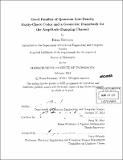Good families of quantum low-density parity-check codes and a geometric framework for the amplitude-damping channel
Author(s)
Riemann, Reina, 1975-
DownloadFull printable version (2.966Mb)
Alternative title
Good families of quantum LDPC odes and a geometric framework for the amplitude-damping channel
Other Contributors
Massachusetts Institute of Technology. Dept. of Electrical Engineering and Computer Science.
Advisor
Peter W. Shor.
Terms of use
Metadata
Show full item recordAbstract
Classical low-density parity-check (LDPC) codes were first introduced by Robert Gallager in the 1960's and have reemerged as one of the most influential coding schemes. We present new families of quantum low-density parity-check error-correcting codes derived from regular tessellations of Platonic 2-manifolds and from embeddings of the Lubotzky-Phillips-Sarnak Ramanujan graphs. These families of quantum error-correcting codes answer a conjecture proposed by MacKay about the existence of good families of quantum low-density parity-check codes with nonzero rate, increasing minimum distance and a practical decoder. For both families of codes, we present a logarithmic lower bound on the shortest noncontractible cycle of the tessellations and therefore on their distance. Note that a logarithmic lower bound is the best known in the theory of regular tessellations of 2-manifolds. We show their asymptotic sparsity and non-zero rate. In addition, we show their decoding performance with simulations using belief propagation. Furthermore, we present a general geometrical model to design non-additive quantum error-correcting codes for the amplitude-damping channel. Non-additive quantum error-correcting codes are more general than stabilizer or additive quantum errorcorrecting codes, and in some cases non-additive quantum codes are more optimal. As an example, we provide an 8-qubit amplitude-damping code, which can encode 1 qubit and correct for 2 errors. This violates the quantum Hamming bound which requires that its length start at 9.
Description
Thesis (Ph. D.)--Massachusetts Institute of Technology, Dept. of Electrical Engineering and Computer Science, 2011. Cataloged from PDF version of thesis. Includes bibliographical references (p. 68-70).
Date issued
2011Department
Massachusetts Institute of Technology. Department of Electrical Engineering and Computer SciencePublisher
Massachusetts Institute of Technology
Keywords
Electrical Engineering and Computer Science.